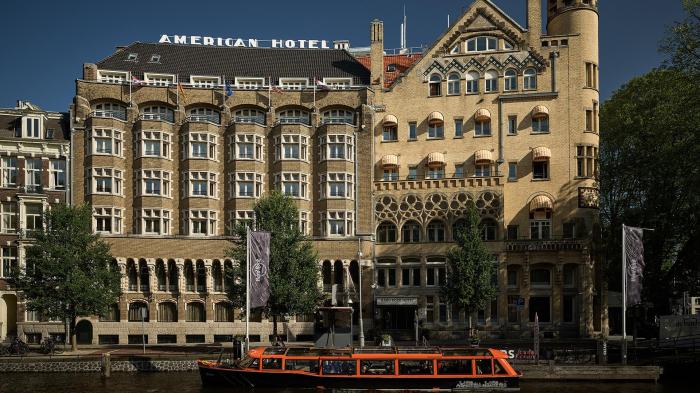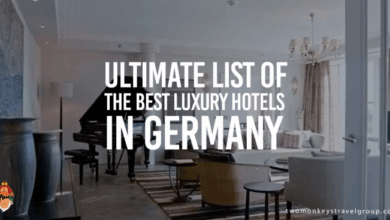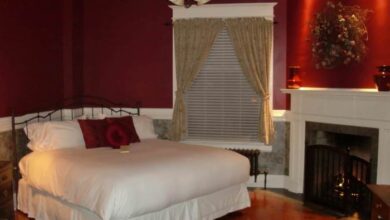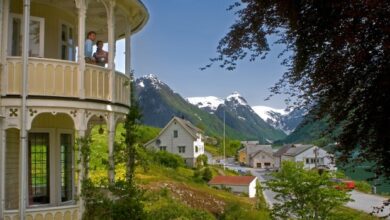Discovering the Allure of Hotels in the Netherlands A Travelers Guide

Discovering the Allure of Hotels in the Netherlands unveils a captivating journey through Dutch hospitality, rich history, and diverse accommodations. From charming boutique hotels to luxurious escapes, the Netherlands offers a unique blend of comfort and cultural immersion. This guide explores the spectrum of hotel experiences, highlighting the distinctive characteristics that set Dutch hotels apart, while showcasing the vibrant local scene and sustainable practices that make them truly special.
This comprehensive exploration delves into the various hotel types, from budget-friendly options to lavish luxury stays. We’ll analyze the unique amenities and services offered, comparing and contrasting them to gain a deeper understanding of the diverse hospitality landscape. Discover the perfect match between your travel style and the perfect hotel experience in the Netherlands.
Introduction to Dutch Hospitality
The Netherlands, renowned for its picturesque canals and windmills, also boasts a unique and welcoming hospitality culture. This culture, deeply rooted in the country’s history and social fabric, extends to its hotels, creating a distinctive experience for visitors. The evolution of Dutch hotels reflects not only changing economic landscapes but also the evolving values and expectations of both residents and tourists.
This approach to hospitality is a key component of the Netherlands’ appeal to travelers.Dutch hospitality is characterized by a blend of efficiency, practicality, and a strong emphasis on comfort. The historical context of Dutch hotels is interwoven with the country’s economic development and evolving tourism industry. The characteristics that distinguish Dutch hotels from those in other regions are numerous and fascinating, revealing a cultural nuance that goes beyond just the physical structure.
A combination of factors contributes to the allure of hotels in the Netherlands, ranging from the country’s rich history and culture to its contemporary amenities and service standards. Understanding the overall hotel landscape in the Netherlands provides a deeper appreciation for the country’s unique offering.
Historical Context and Evolution of Hotels
Dutch hospitality has deep historical roots, evolving from simple inns to the modern hotels we see today. The early stages of hotel development were closely tied to the country’s trade routes and growing merchant class. As the Netherlands emerged as a major trading power, the need for accommodation for travelers and merchants increased. This led to the establishment of inns and taverns, which served as basic lodgings for travelers.
Over time, these establishments improved their facilities and services to meet the demands of a more sophisticated clientele. The development of the Dutch hotel industry paralleled the nation’s economic prosperity, showcasing a continuous adaptation to changing needs.
Unique Characteristics of Dutch Hotels
Dutch hotels often exhibit a blend of traditional charm and modern convenience. This unique blend is reflected in the architecture, design, and amenities offered. For example, many hotels incorporate elements of Dutch design, such as warm color palettes, comfortable furnishings, and attention to detail in décor. The use of natural materials, like wood and stone, often enhances the feeling of warmth and coziness.
Furthermore, Dutch hotels often prioritize practicality and efficiency, reflecting the national character. This can manifest in clear and concise communication, well-organized facilities, and a focus on guest comfort without excessive ornamentation.
Key Factors Influencing the Appeal of Dutch Hotels
Several key factors contribute to the appeal of Dutch hotels. Firstly, the country’s rich history and culture offer a captivating backdrop for hotel experiences. Visitors can explore historical sites, museums, and artistic masterpieces, often integrated seamlessly into the hotel’s design or location. Secondly, the Netherlands boasts a sophisticated infrastructure and well-developed transportation network, making it easy for guests to access various attractions.
The efficient public transportation and high-quality roads facilitate exploration of the country’s diverse landscapes. Moreover, the country’s commitment to sustainability and environmental consciousness plays a role in the appeal of its hotels, with many incorporating eco-friendly practices. This commitment to sustainability, combined with modern amenities, creates a unique selling proposition for the hotels in the country.
Summary of the Netherlands’ Hotel Landscape
The Netherlands’ hotel landscape is diverse, ranging from luxurious boutique hotels to charming, family-friendly accommodations. The country’s hotels cater to a wide spectrum of travelers, offering a range of experiences that complement the country’s diverse attractions. The quality of service, attention to detail, and unique blend of tradition and modernity are key distinguishing features of the Dutch hotel industry.
This combination of historical charm and modern comfort makes the Netherlands a desirable destination for both leisure and business travelers.
Types of Hotels
The Netherlands boasts a diverse range of hotels catering to various needs and budgets. From luxurious accommodations perfect for a romantic getaway to budget-friendly options ideal for solo travelers or families, there’s a hotel type to suit every traveler. Understanding these distinctions allows for a more informed choice, ensuring a satisfying experience tailored to individual preferences.The availability of various hotel types in the Netherlands reflects the country’s rich tourism sector and its appeal to a wide range of travelers.
Each type offers a unique experience, differentiated by amenities, services, and overall ambiance. This section explores the diverse spectrum of hotel types, highlighting their unique selling points and target audiences.
Boutique Hotels
Boutique hotels often feature unique architectural designs, locally inspired interiors, and personalized service. They provide an intimate and curated experience, setting them apart from larger chain hotels. These hotels typically focus on creating a distinctive atmosphere, often prioritizing quality over quantity. They may have smaller room counts, allowing for a more personalized experience.
Luxury Hotels
Luxury hotels offer unparalleled comfort, exceptional service, and a lavish experience. These establishments frequently feature premium amenities, including fine dining options, extensive spa facilities, and personalized concierge services. High-end accommodations, exquisite decor, and meticulously maintained grounds contribute to a luxurious atmosphere. Their target audience encompasses discerning travelers seeking ultimate relaxation and indulgence. For example, a luxury hotel might have a private chef service or a dedicated butler.
Budget-Friendly Hotels
Budget-friendly hotels cater to travelers seeking affordable accommodation without compromising essential amenities. These hotels typically offer basic but functional rooms, focusing on value and practicality. They often have strategic locations, facilitating convenient access to tourist attractions and transportation hubs. These hotels appeal to budget-conscious travelers, such as backpackers, students, or those on a tight budget. Many budget-friendly hotels have a shared lounge area.
Family Hotels
Family hotels are designed with families in mind, offering spacious rooms, kid-friendly amenities, and family-oriented services. These establishments frequently feature kid’s clubs, play areas, and babysitting services, ensuring a comfortable stay for parents and children alike. Such amenities contribute to a positive experience for families traveling together. They often have connecting rooms and play areas.
Table: Types of Hotels in the Netherlands
| Hotel Type | Price Range (Estimated) | Typical Location |
|---|---|---|
| Boutique | Mid-range to High-end | Often in city centers or historic areas |
| Luxury | High-end | May be in city centers, near tourist attractions, or in resort areas |
| Budget-Friendly | Low-end to Mid-range | Strategic locations near public transportation or tourist attractions |
| Family | Mid-range | Often near attractions with family-friendly activities |
Experiences and Activities
The Netherlands, a land of canals, windmills, and vibrant culture, offers a wealth of experiences beyond the typical tourist attractions. Beyond the historical landmarks, visitors can immerse themselves in unique activities and experiences, tailored to diverse interests and budgets. Choosing the right hotel can significantly enhance the tourist experience by offering convenient access to local attractions and activities.Exploring the Netherlands is not just about seeing iconic sights; it’s about actively participating in the local culture and discovering hidden gems.
Hotels strategically located near key attractions provide a perfect base for exploring the country’s diverse offerings. This allows guests to maximize their time and create lasting memories.
Variety of Experiences Near Hotels
The Netherlands boasts a diverse range of activities, catering to a wide spectrum of interests. From art and history to nature and culinary adventures, there’s something for everyone. Hotels near museums, parks, and historical sites offer easy access to these experiences, allowing guests to easily transition between activities and attractions.
Connection Between Hotel Choices and Tourist Activities
The proximity of a hotel to key tourist destinations is a significant factor in a successful vacation. Guests seeking to explore specific areas or participate in particular activities should prioritize hotels situated in close proximity to those attractions. This ensures efficient use of time and reduces travel hassles, enabling guests to maximize their enjoyment.
Popular Attractions and Activities
Numerous popular attractions draw visitors to the Netherlands. Museums like the Rijksmuseum and Van Gogh Museum showcase Dutch masters. The Anne Frank House offers a poignant glimpse into history. Parks like the Vondelpark provide serene escapes from the city’s bustle. Beyond these, activities like canal cruises, bike tours, and visits to charming villages add to the experience.
The variety of options ensures that visitors can tailor their experience to their preferences.
Unique and Memorable Experiences
The Netherlands offers a multitude of unique experiences. Visiting a local market to sample regional delicacies, attending a traditional Dutch music performance, or taking a cooking class to learn about Dutch cuisine are just a few examples. These experiences provide deeper cultural immersion and offer a departure from the typical tourist path. Discovering the hidden gems, beyond the well-known attractions, makes for a truly memorable trip.
- Visiting a local cheese market to sample Dutch cheeses.
- Taking a bike tour through the picturesque countryside.
- Exploring the historic windmills and enjoying the serene landscapes.
- Participating in a tulip-planting experience during the springtime.
- Attending a performance at a local theater or concert hall.
Hotel Proximity to Tourist Attractions
The table below compares hotels based on their proximity to key tourist attractions. This allows for a quick assessment of the convenience each hotel offers for exploring the area.
| Hotel Name | Proximity to Rijksmuseum | Proximity to Anne Frank House | Proximity to Vondelpark | Proximity to Canal Belt |
|---|---|---|---|---|
| Hotel A | Close | Moderate | Far | Close |
| Hotel B | Moderate | Close | Close | Moderate |
| Hotel C | Far | Moderate | Close | Far |
Accommodation Features
Dutch hotels offer a diverse range of accommodation features, catering to various traveler preferences and budgets. From boutique hotels with unique design elements to large chains providing extensive amenities, the options are plentiful. Understanding the essential services and unique offerings is crucial for selecting the perfect hotel experience. This section details the key amenities, highlighting the unique features that set Dutch hotels apart.
Essential Amenities and Services
Dutch hotels consistently prioritize guest comfort and convenience. Standard amenities often include high-speed Wi-Fi, comfortable bedding, and well-equipped bathrooms. Many hotels also provide complimentary breakfast options, varying in quality and scope depending on the hotel category. Furthermore, services like room service, concierge assistance, and laundry facilities are frequently available, enhancing the overall guest experience.
Unique Features Contributing to a Positive Guest Experience
Beyond the standard amenities, Dutch hotels often showcase unique features that contribute to a positive experience. These may include locally inspired design elements, sustainable practices, and partnerships with local businesses. For instance, some hotels feature artwork by Dutch artists or utilize locally sourced products. These touches not only enhance the guest’s stay but also support the local community.
Comparison of Services Across Hotel Categories
The quality and range of services offered differ across various hotel categories. Luxury hotels often provide exceptional service, including personalized concierge services, gourmet dining experiences, and exclusive access to amenities. Mid-range hotels offer a good balance of comfort and affordability, providing standard amenities while maintaining a pleasant atmosphere. Budget-friendly hotels prioritize basic necessities, focusing on value for money without compromising on cleanliness and comfort.
Hotel Design Elements and Sustainability
Interior design plays a crucial role in the overall guest experience. Modern Dutch hotels often showcase minimalist or contemporary designs, emphasizing natural light and comfortable spaces. Sustainability is another prominent aspect, with hotels implementing eco-friendly practices such as energy-efficient lighting, water conservation measures, and the use of recycled materials. For example, some hotels use locally sourced wood for furniture or partner with local businesses that use sustainable farming practices.
Table Illustrating Amenity Range Across Hotel Categories
| Hotel Category | Wi-Fi | Breakfast | Concierge | Sustainability Features |
|---|---|---|---|---|
| Luxury | High-speed, premium | Gourmet, extensive | Personalized, dedicated | Locally sourced materials, energy-efficient appliances |
| Mid-range | Reliable, standard | Buffet, varied options | Basic assistance | Energy-efficient lighting, water-saving fixtures |
| Budget | Standard | Basic breakfast items | Limited assistance | Recycling programs, energy-saving initiatives |
Cultural Immersion
Dutch hotels offer more than just a place to rest; they provide a gateway to experiencing the rich tapestry of Dutch culture. From historical architecture to modern art, the Netherlands boasts a unique blend of tradition and innovation. Hotels play a crucial role in fostering cultural exchange, allowing guests to connect with local customs and traditions.Hotels in the Netherlands often incorporate elements of Dutch design and heritage into their architecture and décor.
This immersion into the local aesthetic provides a subtle but powerful introduction to Dutch culture. Furthermore, many hotels host events and activities that showcase traditional Dutch practices and celebrations. These initiatives contribute to a more holistic and engaging travel experience.
Dutch Traditions in Hotels
Dutch hospitality often intertwines with traditional practices. Hotels may feature artwork by prominent Dutch artists, reflecting the country’s rich artistic heritage. Decor elements like Delftware pottery, traditional textiles, or locally sourced wooden furniture can showcase the unique aesthetic and craftsmanship of the region. The warm welcome and genuine interaction with staff further contribute to the overall experience.
Cultural Events and Activities
Hotels can facilitate participation in various cultural activities. These can range from cooking classes showcasing traditional Dutch cuisine to workshops on pottery or painting techniques. Some hotels might host performances of traditional music or dance, offering a glimpse into the heart of Dutch artistry. Furthermore, hotels often have partnerships with local museums or historical sites, facilitating access to cultural experiences beyond the hotel premises.
For example, a hotel could organize a guided tour of a nearby windmill or a visit to a local market, showcasing the vibrant local life.
Respecting Local Customs
Understanding and respecting local customs is paramount for a positive cultural exchange. Hotels can play a vital role in educating guests about Dutch etiquette and traditions. For instance, clear signage or informational materials about local customs and traditions can enhance guests’ understanding. Hotels should encourage respectful interactions with locals and promote awareness of cultural nuances. A friendly and informative approach from hotel staff is crucial in ensuring a positive experience for all.
Contributing to Cultural Understanding
Hotels contribute to cultural understanding by facilitating interaction between guests and locals. This can be achieved through organized tours, cultural workshops, or social gatherings. By offering opportunities for dialogue and exchange, hotels can foster a deeper appreciation for Dutch culture. This reciprocal understanding benefits both the visitor and the host community. Furthermore, hotels can provide resources about local customs, history, and traditions.
This can include brochures, maps, or even local guides to enhance the guests’ cultural immersion.
Sustainability and Responsibility
The Dutch hospitality industry is increasingly recognizing the importance of minimizing its environmental footprint. Hotels are embracing sustainable practices, aiming to reduce their impact on the planet while enhancing the guest experience. This commitment extends beyond simply using eco-friendly products; it involves a holistic approach to responsible tourism.The Netherlands, with its rich history and commitment to environmental stewardship, sets a high standard for its hotels.
Many establishments are actively seeking ways to mitigate their environmental impact and promote sustainable tourism, recognizing that their actions have far-reaching consequences. This commitment reflects a growing awareness of the industry’s responsibility to preserve the natural beauty and cultural heritage of the region.
Importance of Sustainability in the Hotel Industry
Hotels, as significant consumers of resources and producers of waste, have a crucial role to play in the global effort to combat climate change. Sustainability initiatives are no longer a mere trend but a necessity. Hotels that prioritize sustainability are often rewarded with increased customer loyalty and positive brand image. Sustainable practices, including energy efficiency, water conservation, and waste reduction, are key to creating environmentally responsible accommodations.
These efforts not only contribute to a healthier planet but also reflect a hotel’s commitment to ethical business practices.
Eco-Friendly Practices Adopted by Dutch Hotels
Many Dutch hotels are leading the way in implementing eco-friendly practices. These range from utilizing renewable energy sources, like solar panels, to implementing water-saving fixtures and promoting recycling programs. Composting organic waste and minimizing single-use plastics are further examples of their commitment. The use of locally sourced food and materials is another key aspect of their sustainability efforts.
This support for local farmers and artisans reduces transportation emissions and promotes economic development within the region.
Ways Hotels Promote Sustainable Tourism
Hotels can play a significant role in promoting sustainable tourism by offering educational opportunities to guests. These opportunities might include workshops or presentations on local environmental issues and sustainable practices. Furthermore, hotels can encourage guests to adopt eco-conscious behaviors, like using public transportation or participating in local conservation efforts. Partnering with local environmental organizations and supporting initiatives that protect the natural environment are additional avenues to promote responsible tourism.
By working collaboratively with other stakeholders, hotels can maximize their positive impact.
Environmental Impact of the Hotel Industry and Mitigation Strategies
The hotel industry, despite its economic importance, has a substantial environmental footprint. Energy consumption, water usage, waste generation, and carbon emissions are significant contributors to the industry’s environmental impact. Dutch hotels are actively working to mitigate these impacts through various initiatives. For instance, many are implementing energy-efficient technologies, installing water-saving appliances, and optimizing waste management systems. Their strategies are tailored to address the specific environmental challenges faced by their locations.
Comparison of Sustainability Efforts of Different Hotels
| Hotel | Energy Efficiency | Water Conservation | Waste Management | Local Sourcing |
|---|---|---|---|---|
| Hotel A | Solar panels, LED lighting | Low-flow fixtures, greywater recycling | Composting, recycling program | Local produce, sustainable textiles |
| Hotel B | Renewable energy contracts | Water-efficient landscaping | Zero-waste initiatives | Partnerships with local farms |
| Hotel C | Energy audits and upgrades | Rainwater harvesting | Waste-to-energy systems | Locally crafted souvenirs |
Note: This table provides a simplified comparison. Actual efforts and details may vary significantly between hotels. Additional factors like community engagement and staff training are also crucial aspects of a comprehensive sustainability strategy.
Food and Drink
The Netherlands, renowned for its picturesque canals and vibrant culture, also boasts a captivating culinary scene. From traditional dishes to innovative modern interpretations, Dutch cuisine offers a unique and flavorful experience. Hotels often play a crucial role in showcasing this local culinary heritage, integrating it seamlessly into the overall guest experience.Dutch cuisine, often characterized by its simplicity and fresh ingredients, is more than just a meal; it’s an embodiment of the country’s agricultural heritage and its commitment to high-quality, seasonal produce.
Hotels understand the importance of this connection and strive to represent it through their dining options.
Local Culinary Scene in Hotels
Dutch hotels offer a diverse range of dining experiences, catering to various tastes and preferences. From intimate, cozy cafes serving light bites to grand restaurants offering elaborate multi-course meals, guests can savor a culinary adventure tailored to their needs. The atmosphere of these dining spaces often reflects the ambiance of the surrounding area, enhancing the overall experience.
Significance of Dutch Cuisine in the Hotel Experience
Hotels often highlight the local culinary scene through their menus, showcasing traditional Dutch dishes alongside modern interpretations. This showcases the country’s rich culinary heritage while also introducing guests to contemporary takes on classic recipes. The use of fresh, local ingredients further emphasizes the connection to the region and enhances the dining experience.
Variety of Dining Options
Dutch hotels provide a variety of dining options to cater to different preferences. Breakfasts often feature a buffet of Dutch specialties like herring, cheese, and bread, alongside international options. Lunch menus frequently include light, flavorful options, and dinners may showcase a range of traditional dishes with innovative pairings. Some hotels might even host themed dinners, allowing guests to delve deeper into specific culinary traditions.
Restaurant and Cafe Recommendations
Numerous restaurants and cafes in the vicinity of Dutch hotels offer delectable options. These establishments often feature traditional Dutch dishes, providing an authentic taste of the local cuisine. The availability of local breweries and cider houses also enhances the dining experience. Guests can find options catering to diverse tastes and budgets.
Traditional Dutch Dishes and Where to Enjoy Them
- Stroopwafels: These thin, crispy waffles, drenched in syrup, are a quintessential Dutch treat. Many cafes and bakeries near hotels offer these delectable treats. They’re a perfect sweet ending to a meal or a delightful snack.
- Bitterballen: These savory meatballs are a popular appetizer. They are often served in restaurants throughout the Netherlands. Their savory flavor and crispy exterior make them a great starting point for a meal.
- Hutspot: This hearty stew, featuring potatoes, carrots, and onions, is a comforting and flavorful dish. Many Dutch restaurants and cafes, especially those focusing on traditional cuisine, offer this staple.
- Poffertjes: These small, fluffy pancakes are often served with butter and powdered sugar. Many cafes and restaurants offer them as a delightful breakfast or dessert option.
Visual Representation: Discovering The Allure Of Hotels In The Netherlands
Dutch hotels, renowned for their comfort and charm, offer a visually appealing experience that seamlessly blends architectural heritage with modern design. The aesthetic choices reflect a deep appreciation for the country’s rich history and natural beauty, creating an atmosphere that resonates with both local and international guests. This visual appeal plays a significant role in shaping the overall guest experience, making a memorable stay.The architectural styles of Dutch hotels vary, often showcasing traditional Dutch aesthetics, incorporating elements of neoclassical, or modern design.
This diversity allows for a range of experiences, catering to different tastes and preferences. The ambiance and atmosphere of each hotel type further enhances this experience.
Architectural Styles of Dutch Hotels
Dutch architectural styles, prevalent in many hotels, are often characterized by their use of rich colors, warm lighting, and the incorporation of natural elements. This results in a welcoming and visually appealing environment. Many hotels embrace traditional Dutch design elements, such as gabled roofs, wooden beams, and high ceilings, creating a sense of history and authenticity. Modern hotels, on the other hand, might incorporate sleek lines, minimalist designs, and contemporary furnishings, offering a contrasting yet equally appealing experience.
Ambiance and Atmosphere of Various Hotel Types
The ambiance and atmosphere of a hotel significantly contribute to the guest experience. Boutique hotels, for example, often feature a cozy and intimate atmosphere, with personalized touches that create a sense of exclusivity. Luxury hotels, on the other hand, are known for their opulent and sophisticated ambiance, providing a luxurious and lavish experience. Hotels located in rural areas might feature a tranquil and serene atmosphere, immersing guests in the natural beauty of the surroundings.
Business hotels prioritize efficiency and practicality, creating a professional and functional environment.
Role of Interior Design in Guest Experience
Interior design plays a crucial role in creating a memorable guest experience. Well-designed spaces, whether traditional or modern, evoke a specific mood and enhance the guest’s overall satisfaction. Thoughtful use of colors, textures, and lighting contributes to a visually stimulating and enjoyable stay. Attention to detail, including the selection of furniture, artwork, and accessories, further adds to the unique ambiance of each hotel.
Use of Natural Light and Colors in Hotel Design, Discovering the Allure of Hotels in the Netherlands
The use of natural light and colors is integral to the aesthetic appeal of Dutch hotels. Many hotels maximize natural light by incorporating large windows and strategically placed mirrors, creating a bright and airy atmosphere. Color palettes often feature earthy tones and warm colors, such as warm browns, creams, and muted blues, to evoke a sense of tranquility and comfort.
These color choices, in combination with natural light, create a visually appealing and welcoming atmosphere.
Examples of Captivating Images Representing Dutch Hotel Experiences
Imagine a hotel with high ceilings and large windows, allowing ample natural light to flood the room. Wooden beams and exposed brick walls add a touch of rustic charm. The use of soft, warm lighting creates a cozy atmosphere, while strategically placed artwork and furniture complement the overall design. Another example might be a modern hotel with minimalist design, sleek lines, and clean architectural forms.
Large windows offer stunning views of the surrounding landscape. These images collectively highlight the visual appeal of Dutch hotels and the various styles they encompass.
Travel and Logistics

The Netherlands boasts an exceptionally well-developed transportation infrastructure, making it remarkably easy for international travelers to access and navigate the country. From bustling airports to efficient train networks, travelers can seamlessly connect to various hotels across the nation. This ease of access, coupled with the convenient layout of many Dutch cities, ensures a smooth and enjoyable travel experience.The efficient transportation system in the Netherlands facilitates quick and affordable travel to and from hotels, regardless of their location.
Whether you’re arriving by air or rail, the connections are typically straightforward and reliable, minimizing travel time and maximizing your time exploring the country.
Ease of Access for International Travelers
The Netherlands’ international airports, particularly Schiphol Airport (AMS), offer extensive connections to major cities worldwide. This extensive network of flights allows for direct and convenient access to various hotels, irrespective of their location within the country. The airport’s well-organized facilities and efficient ground transportation further enhance the travel experience.
Transportation Options to and from Hotels
Several transportation options are available for travelers to reach their hotels from airports or train stations. These options include direct train lines, efficient bus services, and ride-sharing platforms. The reliability and affordability of these methods make getting to and from accommodations a straightforward process.
Convenience and Efficiency of the Transportation Network
The Netherlands’ public transportation network is renowned for its punctuality, efficiency, and comprehensive coverage. Trains and buses connect major cities and towns seamlessly, allowing for easy travel to hotels in both urban and rural areas. This efficient system reduces travel time and stress, enabling travelers to fully enjoy their stay.
Proximity of Hotels to Airports and Train Stations
Many hotels in the Netherlands are strategically located near major airports and train stations, minimizing travel time and ensuring a convenient stay. This proximity is particularly beneficial for travelers seeking easy access to attractions and other destinations. This well-planned urban design and hotel placement contribute to a seamless travel experience.
Travel Options to Different Hotels
| Hotel | Travel Option | Estimated Cost (EUR) | Estimated Duration (hrs) |
|---|---|---|---|
| Hotel De L’Europe (Amsterdam) | Train from Schiphol Airport | 20-30 | 30-45 minutes |
| Grand Hotel Huis ter Duin (Kennemerland) | Train from Amsterdam Centraal Station | 30-40 | 1-1.5 hours |
| Hotel Pulitzer (Rotterdam) | Train from Rotterdam Centraal Station | 15-25 | 45-60 minutes |
| Hotel De Wereld (The Hague) | Train from Schiphol Airport | 25-35 | 1-1.25 hours |
This table provides approximate estimates for travel options, costs, and durations. Actual costs and times may vary based on specific travel dates and schedules.
Final Wrap-Up
In conclusion, discovering the allure of hotels in the Netherlands is an enriching experience that transcends mere accommodation. The country’s rich history, diverse hotel types, and vibrant cultural scene offer a unique blend of comfort, adventure, and cultural immersion. From the historical context to the modern amenities and sustainable practices, this guide has highlighted the essence of Dutch hospitality, showcasing the many facets of a memorable travel experience.
We encourage you to embark on your own exploration and discover the charm of Dutch hotels for yourself.




